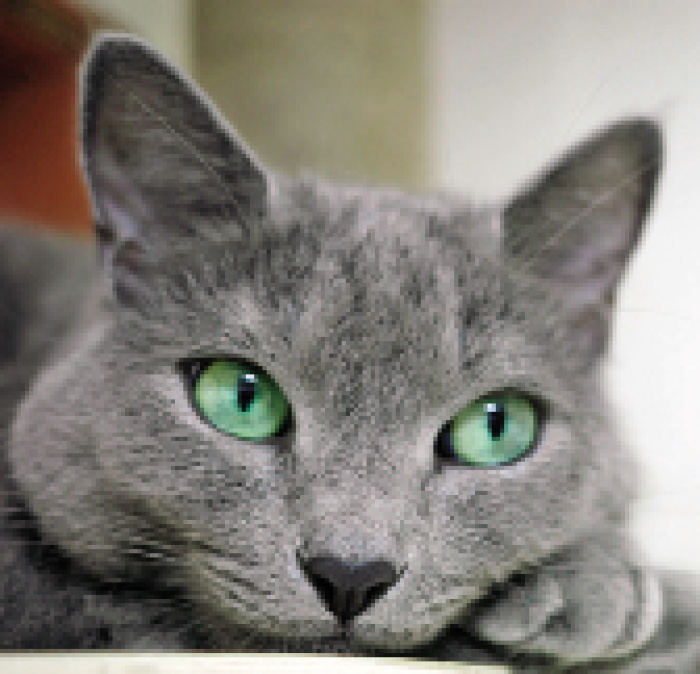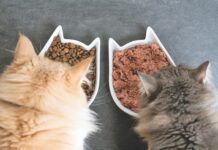Q: We have a 14-year-old female Russian Blue cat who has been recently diagnosed with hyperthyroidism. She has a ravenous appetite and continues to lose weight despite this.
What is the best treatment for this condition in an older cat?
A: Thank you for getting in touch about this common disease in cats, and given the fact that there are several options for treatment, we are frequently asked this question. Perhaps a quick review of treatment options for feline hyperthyroidism would be helpful.
Hyperthyroidism in cats most commonly results from benign tumors of the thyroid gland (found near the “voice box”, or larynx, in the neck) that cause the gland to produce too much thyroid hormone. Iodine is vital for the thyroid gland’s production of thyroid hormone, and, for this reason, thyroid glands attract and concentrate iodine within them as part of their normal (and abnormal, in this case) physiology.
These are treatment options available to treat feline hyperthyroidism:
I 131 Radioiodine Therapy (RAIT): This involves the injection of a radioactive form of iodine into an affected cat. The thyroid gland attracts this molecule and concentrates it in its structure, and the radioactivity of the molecule destroys the overactive thyroid tumor tissue. This therapy is effective about 95% of the time, and when it works, cats are effectively cured. The primary risk of RAIT is destroying too much normal thyroid tissue, resulting in an underactive thyroid gland (hypothyroidism), which may require thyroid hormone supplementation. Treated cats must usually be quarantined for between 3 and 5 days until the radioactivity of their waste (urine and feces) drops below acceptable levels. While RAIT requires a relatively large investment up front, comparison with the long-term cost of other therapies often reveals that RAIT is comparatively cost-effective. An important consideration is that cats that have other diseases that require daily therapy may not be good candidates due to the need for post-treatment quarantine. Most veterinarians consider RAIT to be the treatment of choice in cats that are otherwise healthy and can be quarantined safely.
 Anti-thyroid medications: These drugs, which can be administered orally or transdermally, decrease thyroid hormone production by the thyroid gland. They must be given daily for life, and if they are discontinued, an affected cat will revert to a hyperthyroid state. Some cats have adverse reactions to these drugs, some of which can be serious, but most resolve with discontinuation of therapy. Regular health checks and bloodwork, including measurement of thyroid hormone levels, are required for cats receiving these drugs.
Anti-thyroid medications: These drugs, which can be administered orally or transdermally, decrease thyroid hormone production by the thyroid gland. They must be given daily for life, and if they are discontinued, an affected cat will revert to a hyperthyroid state. Some cats have adverse reactions to these drugs, some of which can be serious, but most resolve with discontinuation of therapy. Regular health checks and bloodwork, including measurement of thyroid hormone levels, are required for cats receiving these drugs.
Iodine-restricted diet: Restricting dietary iodine concentrations decreases thyroid hormone production, but cats treated in this manner must receive ONLY such a diet for the duration of their lives. This can be difficult in a household that has more than one cat, and the long-term health effects of an iodine restricted diet have yet to be well-established in cats.
Surgical removal of the thyroid gland: While this used to be a mainstay of treatment, it is  rarely pursued these days, as there are other effective options that do not incur the risks of surgery, including anesthetic risks, infection, and the inadvertent removal of the parathyroid gland, which is vital for normal calcium metabolism.
rarely pursued these days, as there are other effective options that do not incur the risks of surgery, including anesthetic risks, infection, and the inadvertent removal of the parathyroid gland, which is vital for normal calcium metabolism.
Please discuss these options carefully with your veterinarian. If your cat is otherwise healthy, I would strongly suggest that you consider RAIT if this is feasible for you. Best of luck, and please send us an update when you can.




